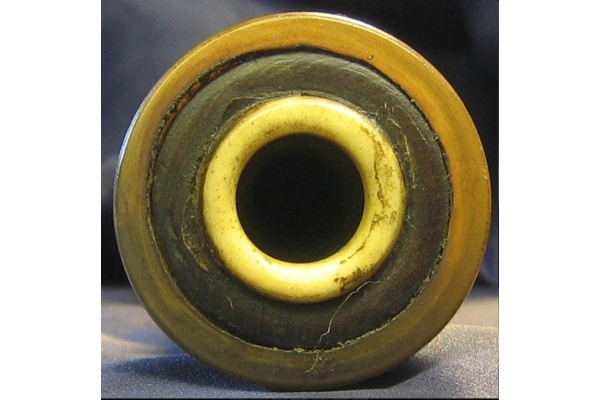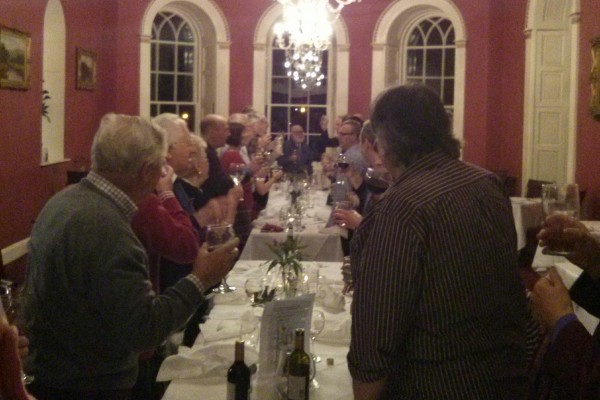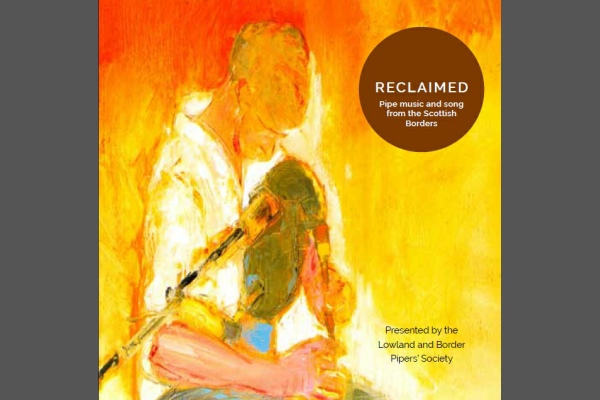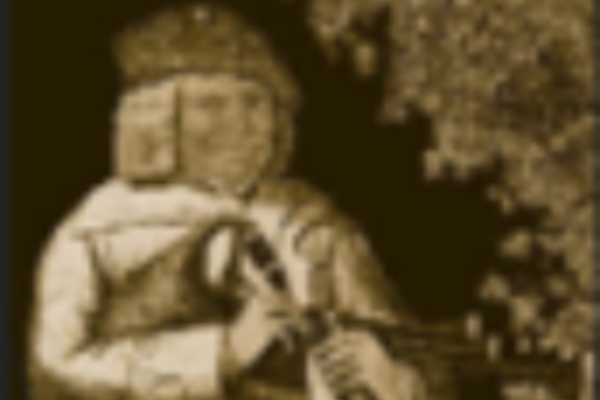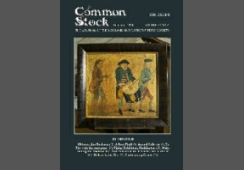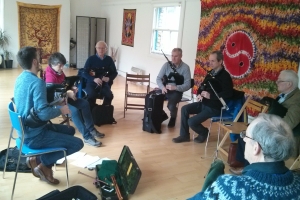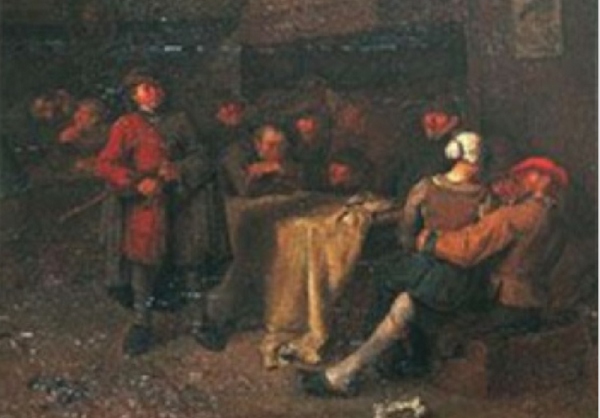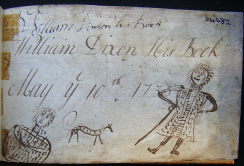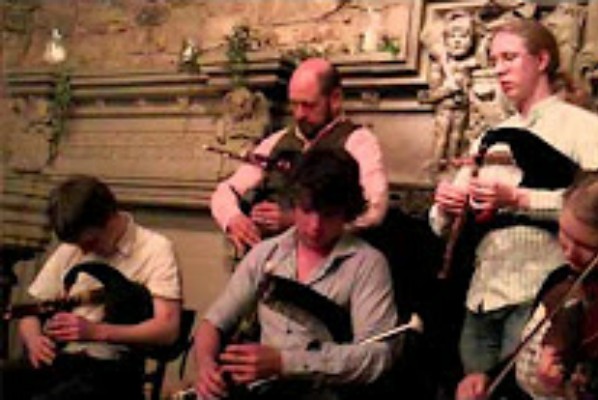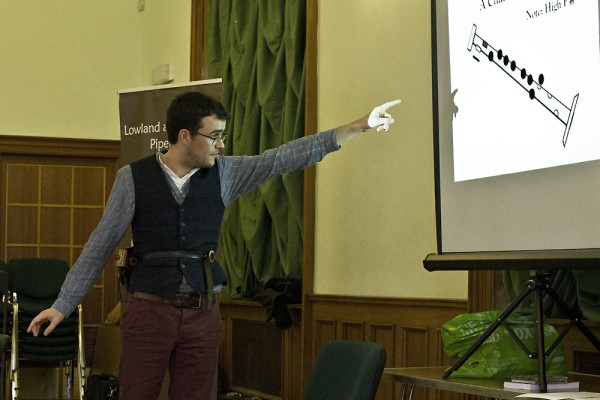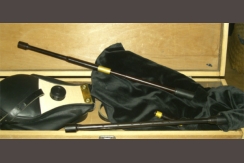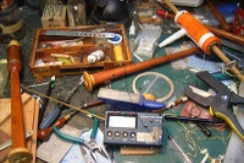A SMALLPIPER’S JOURNEY
Robert Porter tells how he came to playing Scottish smallpipes
I went to board at Campbell College in Belfast in 1978 at the age of 13. Campbell had a pipe band, and my father said to me, with a twinkle in his eye: “Son you will learn to play the bagpipes.” I looked at him askance: “Why would I want to play the bagpipes, I want to learn the electric guitar?” My dad wisely replied “You may not understand what I mean just now, but if you become a piper you’ll never have to buy a drink for yourself again in your life.”
Well, it’s true that I didn’t quite then understand what he meant, but nevertheless I decided to give the pipes a go. I grasped hold of a practice chanter and I never looked back. My teacher was the band tutor Andy Wilson, who had been the Pipe Sergeant in the Royal Ulster Rifles. A number of important things happened at Campbell for me in the piping context. First, it soon became clear I had the fingers to become a really good piper, and I eventually rose through the ranks to become Pipe Major. Secondly, I met a youth called Peter McCalister, who was the Pipe Major before me, and who would eventually become a Piobaireachd specialist and win the Gold Medal at Inverness a couple of years ago. Peter soon became one of my best friends.
After Campbell I went up to Pembroke College, Cambridge to read Law. It was here that I committed what in piping terms can only be described as a gross felony. One of the fellows at Pembroke, and my Roman Law Tutor, was a man called James Campbell, the grandson of Archibald Campbell of the Kilberry Book. James was a prominent Piobaireachd judge and knew all the Kilberry tunes off by heart. He was there for me any time I wanted, but I was too interested in carousing and hellraising to focus in on serious Piobaireachd playing, so in my three years there I only had two lessons off him. As they say, “youth is wasted on the young”.
There were three pipers at Pembroke: myself, Rory MacLeod, from Skye, and Andy Hattrick, a MacCrimmon. One day Ted Hughes was to be given an honorary degree, and we were asked to pipe for the Duke of Edinburgh and him while they attended a tea party on the First Court lawn. We were introduced to Ted Hughes, who, smoothly took us through his knowledge of piping: to me, “Ireland was the original home of piping”; to Rory “Skye is the home of piping in Scotland”; to Andy, “the MacCrimmons were the best pipers of all”. I have no idea if he had been briefed, but if he hadn’t it was a perceptive tour de force.
After Pembroke I went to work in London and I became a proficient, if a little undisciplined, solo piper. I played at weddings, I played with bands in pubs, I twice played on New Year’s Eve with the Ulster Orchestra. I was doing well on one level, and everyone loved it, and indeed my dad’s prophesy came true that I would never have to buy a drink for myself; but I wasn’t doing much disciplined practice and I knew I was coasting.
When I was 27 my dad bought me a set of Uilleann Pipes for Christmas. This was an important moment for me. I strapped on the bellows and started to practice, and it was here I developed my love for the Irish repertoire and Irish session music. In particular, there were two things I immediately understood: the Uilleann Piping tradition was mostly an oral tradition rather than a written one; and in Uilleann Piping circles improvisation is applauded rather than condemned. The Uilleann Pipes are inevitably a solo instrument, so there was never any need to write the tunes down to ensure consistency and conformity.
Sadly, I felt it best to give up the Uilleann Pipes after a few years. This article is not the place to rehearse why, but for those who are interested you can find my article on the subject online by searching up Robert Porter Irish Times and finding a piece called Uillean Pipes Weren’t Worth a Knee-Capping.
I continued with my Highland Piping, but incorporating a few tricks from my Uilleann Piping experience such as playing The Dark Island with slides and vibrato (James Campbell would probably turn in his grave). One day when I was in my mid-forties I played at a Burns Night Supper, and I played like a drain. I knew I had reached a crossroads – my coasting had reached the end of the road. I either had to start practising seriously again or give up. Surprisingly, perhaps, I chose to give up, partly because, living in London, I didn’t really know where I could practise. I put my pipes in the loft, and never once played the set of smallpipes Peter McCalister had sourced for me from the late Iain Ketchin because he had thought they might in some ways be reminiscent of the Uilleann Pipes.
And that’s the way it stayed, until Lockdown. At the beginning of Lockdown, I asked myself what I was going to do with all that time, and my mind inevitably turned to the pipes. I’ll be honest and say that I did think about majoring on the Uilleann Pipes, but discretion was the better part of valour: I could dust off my piping fingers on the Scottish pipes in six months, but it would take me seven years to master the Uilleann Pipes, regulators and all.
I talked all this through with Peter McCalister, and fate was sealed when he offered to give me a weekly piping lesson where he would put me on the right track and teach me some Piobaireachd. He also suggested, if I still had a yearning for the Uilleann Pipes, that I strap on my smallpipes as a compromise, especially since I could practice them indoors without disturbing the neighbours.
So that’s exactly what I did and I have never looked back. Things moved slowly at first, but I will never forget that moment of delight when a metaphorical sluice-gate opened and all my past experience suddenly flowed back to me like a Tsunami: except now I had a strict teacher in Peter who wouldn’t let me get away with Blue Murder as I had for years in the pubs.
I explained to Peter, that, while I loved Piobaireachd, I was also influenced by the Irish repertoire and session playing, and I would need both to be happy. Peter wisely replied that this might work very well, because while Piobaireachd would give me discipline, technique and intellectual stimulus, the session playing would also allow for the improvisation and free-style playing which I obviously craved.
So I joined the LBPS and the Piobaireachd Society, and promised myself I would enter into the Intermediate Class in the 2021 LBMS Competition – I am already working on a three minute set.
I hope to have a long, productive and happy membership of the LBPS, but if there is one thing I am sad about it is that there seems to be no competition for Piobaireachd on the smallpipes. Maybe it’s something the Society might think about, for to my mind there is no sweeter sound than Piobaireachd played on a well-tuned set of smallpipes.
I used to joke that the definition of a gentleman was someone who knows how to play the pipes and doesn’t. I tried that one for ten years, and it didn’t work. To the contrary, I have wisely learned that if you know how to play the pipes the only gentlemanly thing to do is to strap on your bellows and play them to the best of your ability. And that is exactly what I intend to do.
Robert Porter
